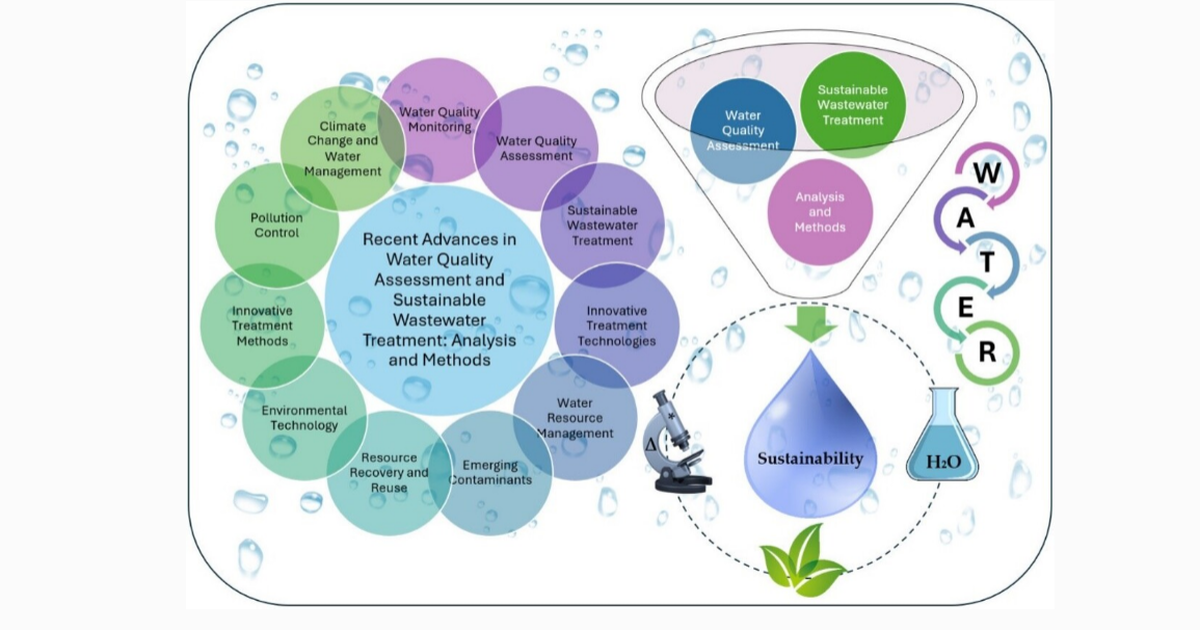Recent Advances in Water Quality Assessment and Sustainable Wastewater Treatment: Analysis and Methods
A special issue of Sustainability (ISSN 2071-1050). This special issue belongs to the section "Sustainable Water Management".
Deadline for manuscript submissions: 30 September 2025 | Viewed by 616

Special Issue Editors
Interests: wastewater treatment; water quality; water engineering; geographic information system; environment; biological wastewater treatment
Special Issue Information
Dear Colleagues,
The effective management of water quality and wastewater treatment has become increasingly critical due to rising urbanization, industrialization, and climate change. The growing accumulation of wastewater underscores the urgent need for innovative and sustainable solutions. As global populations and industrial activities expand, the pressure on water resources intensifies, highlighting the necessity for advanced approaches to manage and preserve water quality.
Traditional water treatment methods, while foundational, often struggle to address the complex range of contaminants and the need for efficient resource recovery. With escalating pollution and evolving regulatory demands, there is a pressing need for advancements that improve both the effectiveness and sustainability of these processes.
Recent technological and methodological innovations are revolutionizing water quality assessment and wastewater treatment. Advanced monitoring techniques and novel treatment technologies are crucial for enhancing water quality, reducing environmental impacts, and ensuring the sustainable reuse of treated water.
This Special Issue seeks to provide a comprehensive overview of the latest research, challenges, and innovations in these areas. We welcome original research articles and reviews on topics such as emerging contaminants, innovative treatment methods, resource recovery and reuse, and climate change adaptation strategies. Your contributions will be essential in advancing knowledge and practice in these critical fields.
The purpose of the Special Issue titled “Recent Advances in Water Quality Assessment and Sustainable Wastewater Treatment: Analysis and Methods” is to provide a platform for publishing recent and innovative research on water quality assessment and sustainable wastewater treatment.
We invite original research articles and reviews that cover a wide range of topics related to water quality and wastewater management. Research areas may include, but are not limited to, the following:
- Water Quality Assessment: Innovations in monitoring techniques, real-time analysis, and assessment methodologies for evaluating water quality.
- Sustainable Wastewater Treatment: Advances in treatment technologies that enhance sustainability, reduce environmental impact, and promote resource recovery.
- Emerging Contaminants: Identification and removal of new and emerging pollutants from water sources.
- Climate Change and Water Management: Strategies and technologies for adapting water management practices in response to climate change.
- Environmental Impact Assessment: Methods for evaluating the environmental impacts of water treatment processes and management practices.
- Resource Recovery and Reuse: Techniques for recovering valuable resources from wastewater and promoting the reuse of treated water.
- Innovative Treatment Methods: Development and application of new treatment technologies and methodologies to improve efficiency and effectiveness.
We look forward to your submissions and to advancing the field of water management and treatment through this Special Issue.
Dr. Yaneth A. Bustos-Terrones
Dr. Juan Gabriel Loaiza
Guest Editors
Manuscript Submission Information
Manuscripts should be submitted online at www.mdpi.com by registering and logging in to this website. Once you are registered, click here to go to the submission form. Manuscripts can be submitted until the deadline. All submissions that pass pre-check are peer-reviewed. Accepted papers will be published continuously in the journal (as soon as accepted) and will be listed together on the special issue website. Research articles, review articles as well as short communications are invited. For planned papers, a title and short abstract (about 100 words) can be sent to the Editorial Office for announcement on this website.
Submitted manuscripts should not have been published previously, nor be under consideration for publication elsewhere (except conference proceedings papers). All manuscripts are thoroughly refereed through a single-blind peer-review process. A guide for authors and other relevant information for submission of manuscripts is available on the Instructions for Authors page. Sustainability is an international peer-reviewed open access semimonthly journal published by MDPI.
Please visit the Instructions for Authors page before submitting a manuscript. The Article Processing Charge (APC) for publication in this open access journal is 2400 CHF (Swiss Francs). Submitted papers should be well formatted and use good English. Authors may use MDPI's English editing service prior to publication or during author revisions.
Keywords
- water quality monitoring
- water quality assessment
- sustainable wastewater treatment
- innovative treatment technologies
- water resource management
- emerging contaminants
- resource recovery and reuse
- environmental technology
- innovative treatment methods
- pollution control
- climate change and water management
Benefits of Publishing in a Special Issue
- Ease of navigation: Grouping papers by topic helps scholars navigate broad scope journals more efficiently.
- Greater discoverability: Special Issues support the reach and impact of scientific research. Articles in Special Issues are more discoverable and cited more frequently.
- Expansion of research network: Special Issues facilitate connections among authors, fostering scientific collaborations.
- External promotion: Articles in Special Issues are often promoted through the journal's social media, increasing their visibility.
- e-Book format: Special Issues with more than 10 articles can be published as dedicated e-books, ensuring wide and rapid dissemination.
Further information on MDPI's Special Issue polices can be found here.






